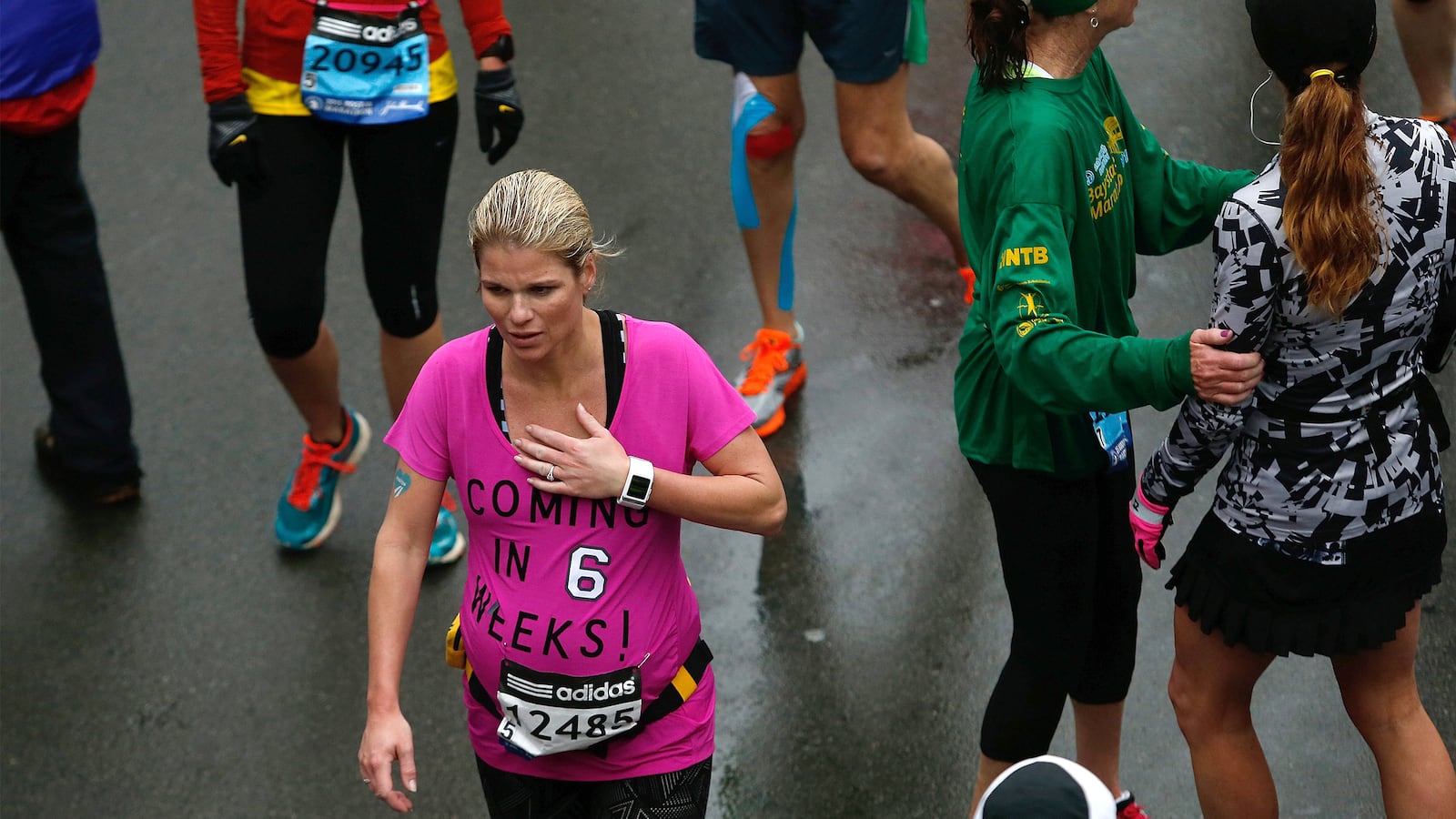All over the city, sweaty demigods with calves of steel were stumbling around Boston on Monday, wrapped in silver capes or “heatsheets,” having finished running 26.2 miles of its world-famous marathon before I had time to pour my second cup of coffee.
Just in case I wasn’t embarrassed enough about my wheezy, flat-footed self, a woman named Amy Keil just finished the race 7½ months pregnant. On Monday afternoon, she stood at the finish line with a full moon belly and a glowing smile while posing for reporters.
There is nothing cooler than a badass pregnant woman. Keil, 35, of Minneapolis, might just be the M.I.A. of marathon running.
Remember M.I.A’s 2009 Grammy performance? She jumped on stage with Jay Z, Kanye West, T.I., and Lil Wayne in a sheer polkadot bikini dress, nine months pregnant, and belted out, “Swagger Like Us.” She went into labour hours later, giving birth to a baby boy.
But running the Boston Marathon is a feat that even for my totally, 100 percent unpregnant (sorry, Mom) self would inevitably lead to serious injury. So is running six weeks before your due date safe?
I spoke to Jodi Abbott, a doctor at the Boston Medical Center who specializes in maternal and fetal medicine, to get answers.
Abbott can’t speak about Keil’s health in particular. She doesn’t know Keil, and there’s been little reporting about her athletic training and experience. All we know is she looked fantastic at the finish line.
Abbott says for elite athletes, running pregnant is not usually an issue.
“We know that they can tolerate much more exercise without distress,” she says. “Exercise and pregnancy is always encouraged. The question is how much is safe.”
There are actually no medical limits or guidelines on how much exercise is safe for women. It all depends on the individual and at what point they begin to demonstrate certain warning signs.
Those warning signs include dehydration, a steady temperature, shortness of breath, dizziness, chest pains, and vaginal bleeding.
Because Monday was a cool, rainy day, it was a pretty good environment for Keil’s run. So long as she didn’t demonstrate any of those warning signs, she’s fine, says Abbott.
(I, on the other hand, demonstrated most if not all of the warning signs just thinking about marathon running and pregnancy.)
The standard medical advice—encouraging pregnant women to work out—is a sharp contrast to recommendations given to women just 20 years ago.
“The old-fashioned if you’re pregnant, put your feet up has shown to not be nearly as safe,” says Abbott.
Basically, in the last 10 to 15 years women started ignoring doctors’ advice. Studies, Abbott says, were then run on these women. It showed that the women who exercised had better pregnancies.
Keil, who finished Monday in 4 hours, 19 minutes, represents a changing tide in the way female elite athletes manage their families. In 2007, Paula Radcliffe won the New York City Marathon seven months after giving birth. She didn't run the race pregnant, but she maintained an intense training routine throughout. The move was shocking at the time but has since become more common.
As The New York Times reported last year, women’s professional running careers are now stretching into their late 30s, and competing while pregnant has become more and more common. Childbirth is slowly losing the stigma of an injury.
That doesn’t mean these runners—including Keil, who’s experiencing her own mini-Twitter backlash—are escaping public scrutiny. Last year, Olympic runner Alysia Montaño ran an 800-meter race while eight months pregnant. But the criticism didn’t seem to faze Montaño.
“I wanted to help clear up the stigma around women exercising during pregnancy, which baffled me,” she told The New York Times. “People sometimes act like being pregnant is a nine-month death sentence, like you should lie in bed all day. I wanted to be an example for women starting a family while continuing a career, whatever that might be. I was still surprised by how many people paid attention.”
“Giving birth is a very athletic activity, like going through intervals on the track,” Montaño said. “Like contractions, intervals can start out easy and progress as they get harder. There’s sometimes a point where you wonder, ‘Can I do one more set?’ But you know you’re going to make it. And then you kick to the finish.”
So if you’re a pregnant woman, should you run 26.2 miles? Not unless you do that sort of thing typically.
“It really does depend on where you start from,” says Abbott. Pregnant women are encouraged to exercise but are still not advised to overdo it.
Falling is a risk for pregnant women. This winter, even just walking around in the snow and ice posed special dangers for them.
Abbott has a solution: dancing.
“You can do it at your home, you can do it with your family, you don’t have to worry about child care or ice and snow,” she says.
If I were to get knocked up, running Heartbreak Hill still wouldn’t be on my to-do list. But, say, doing a water aerobics dance class would be on the list—even if I wouldn’t look as good doing it as Amy Keil did Monday at the finish line.






